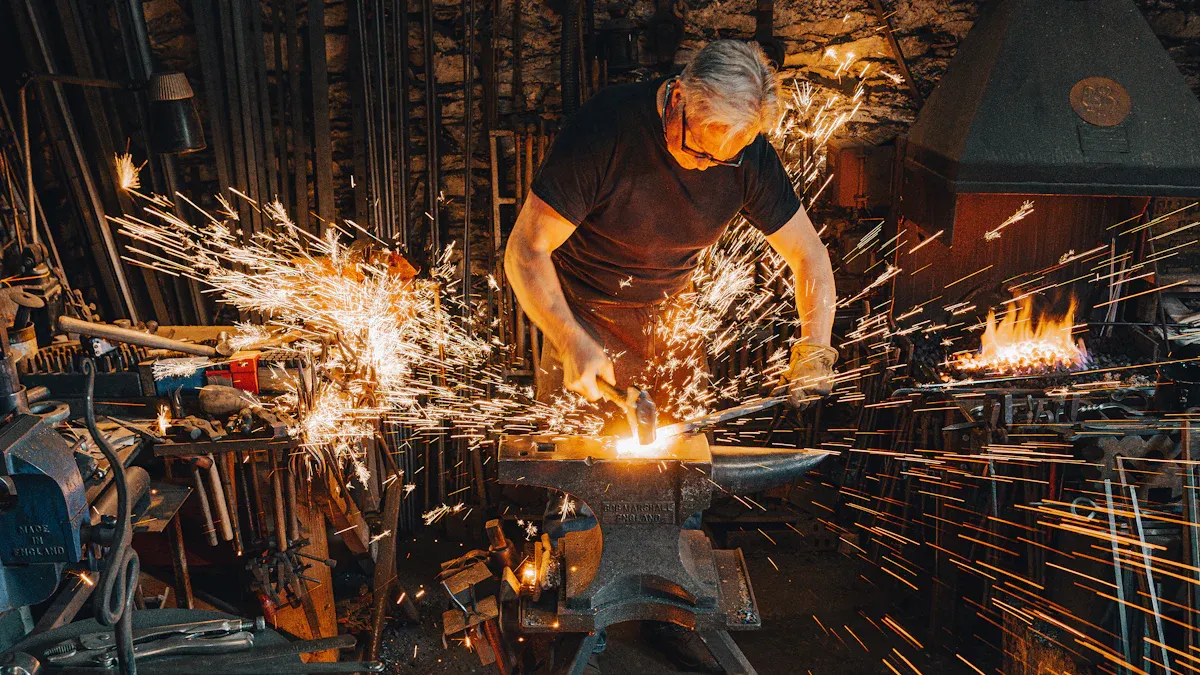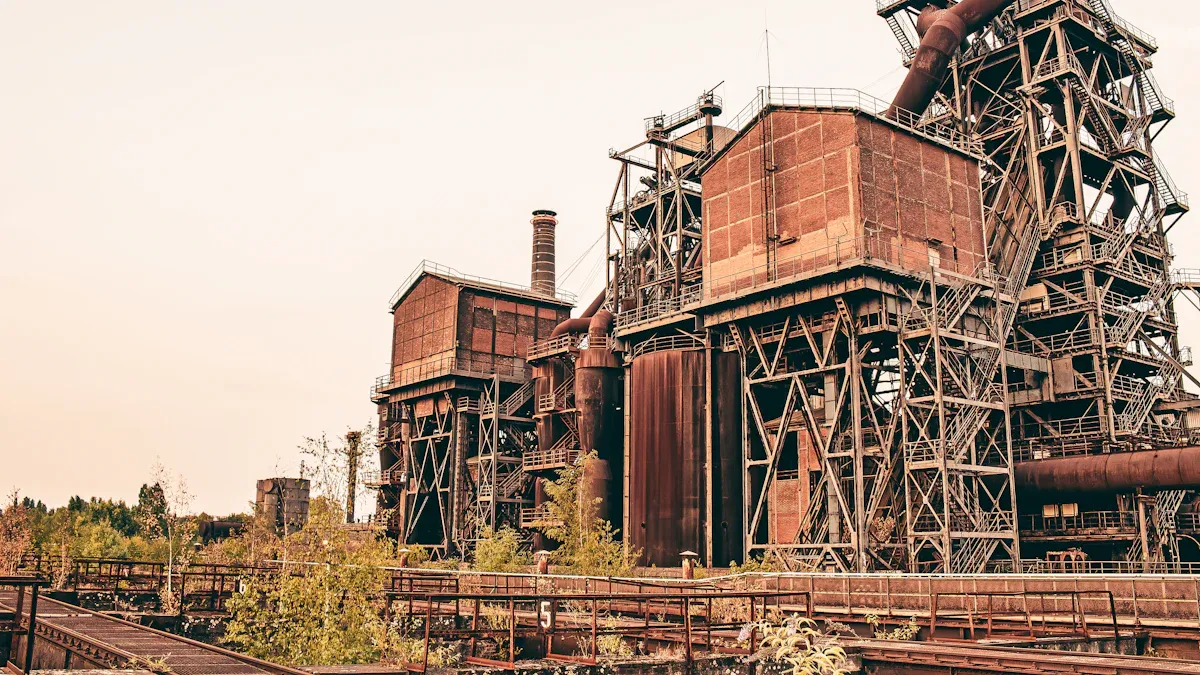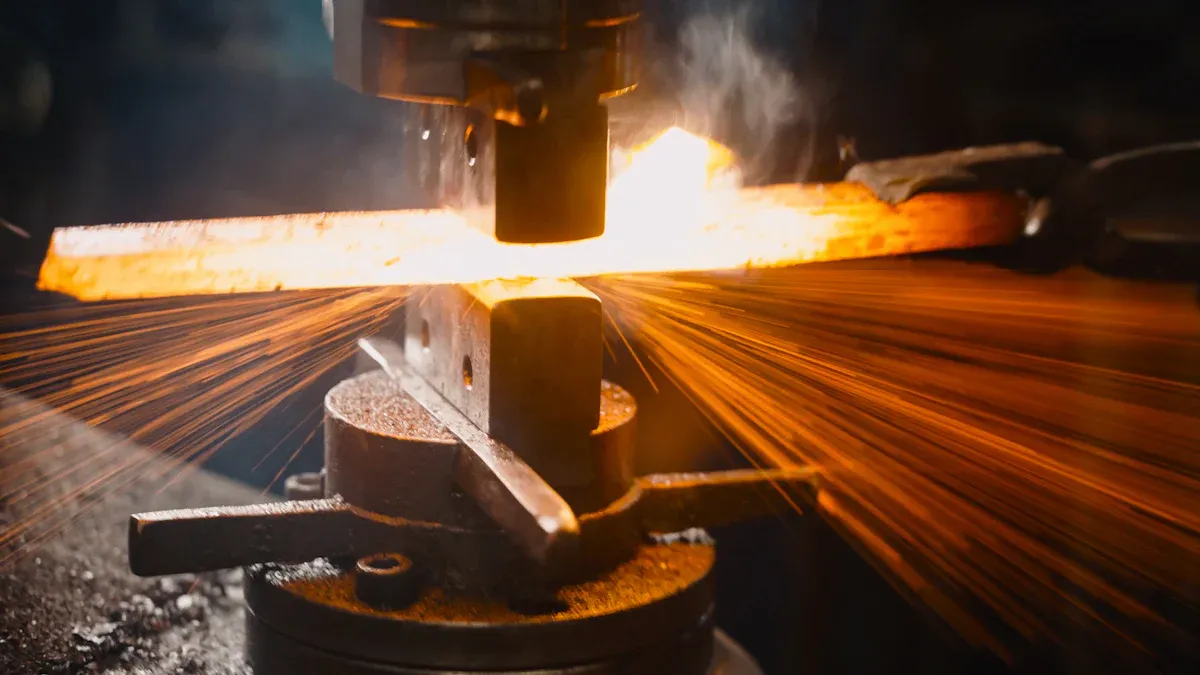
The forging manufacturing industry shapes Europe’s industrial backbone. It provides essential components for sectors like automotive, aerospace, and energy. As you look toward 2025, you’ll notice how forging companies embrace cutting-edge technology and sustainable practices. These advancements not only improve efficiency but also reduce environmental impact. The top forging manufacturing companies continue to lead this transformation, setting benchmarks for quality and innovation. Their efforts drive economic growth and ensure Europe remains a global leader in industrial production.
Key Takeaways
- The forging industry is important for cars, planes, and energy. It helps Europe’s economy grow.
- Companies now focus on being eco-friendly to protect the environment.
- New technologies like 3D printing and AI improve product quality and speed.
- Leading forging companies make customers happy with great products and custom solutions.
- New markets and green energy projects offer big chances for growth.
Overview of the Forging Industry in Europe

Growth and Market Trends
The forging industry in Europe has experienced steady growth over the years. You can see this reflected in the increasing demand for forged components across various industries. The market has expanded due to advancements in manufacturing technologies and the adoption of automation. These changes have improved production efficiency and reduced costs.
In 2025, the forging sector is expected to grow even further. This growth is driven by the rising need for lightweight and durable materials in industries like automotive and aerospace. Additionally, Europe’s focus on modernizing its industrial base has created opportunities for forging companies to innovate and expand their operations.
Key Sectors Driving Demand
Several key sectors fuel the demand for forged products. The automotive industry remains one of the largest consumers. You’ll find forged components in engines, transmissions, and suspension systems. The aerospace sector also relies heavily on forging for critical parts like turbine blades and landing gear.
Energy production is another major driver. Renewable energy projects, such as wind turbines, require forged components for their durability and strength. The construction and heavy machinery industries also contribute significantly to the demand for forging. These sectors depend on forged parts for their reliability under extreme conditions.
Role of Sustainability and Innovation in Forging
Sustainability has become a central focus for the forging industry. You’ll notice companies adopting eco-friendly practices, such as using recycled materials and reducing energy consumption. These efforts align with Europe’s commitment to achieving carbon neutrality.
Innovation plays a crucial role in shaping the future of forging. Advanced technologies like 3D printing and artificial intelligence are transforming how companies design and produce forged components. These innovations not only improve product quality but also enhance efficiency. The Top Forging Manufacturing Companies are leading the way by integrating these technologies into their operations.
Top Forging Manufacturing Companies in Europe 2025
Bharat Forge Ltd.
Specialties and Core Products
You’ll find Bharat Forge Ltd. at the forefront of the forging industry. The company specializes in producing high-strength components for automotive, aerospace, and energy sectors. Its core products include crankshafts, connecting rods, and chassis components. Bharat Forge also excels in manufacturing lightweight forged parts, which are essential for modern vehicles and aircraft.
The company’s advanced forging techniques ensure precision and durability. By integrating cutting-edge technologies like automation and data analytics, Bharat Forge has optimized its production processes. This focus on innovation allows it to meet the evolving demands of global markets.
Achievements and Market Impact
Bharat Forge has achieved significant milestones in recent years. It has expanded its presence in Europe by establishing partnerships with leading automotive and aerospace manufacturers. The company’s commitment to sustainability has also set it apart. By adopting eco-friendly practices, it has reduced its carbon footprint while maintaining high production standards.
Its contributions to the forging industry have strengthened Europe’s industrial base. Bharat Forge’s ability to deliver high-quality products has earned it a reputation as one of the Top Forging Manufacturing Companies in the region.
ThyssenKrupp Forged Technologies
Specialties and Core Products
ThyssenKrupp Forged Technologies focuses on producing forged components for heavy industries. Its specialties include large-diameter bearings, crankshafts, and gear components. These products are vital for sectors like construction, mining, and energy.
The company’s expertise in precision forging ensures that its products meet the highest quality standards. ThyssenKrupp also invests heavily in research and development to create innovative solutions for its clients.
Achievements and Market Impact
ThyssenKrupp has played a key role in advancing the forging industry. Its innovative products have improved the efficiency and reliability of heavy machinery worldwide. The company’s focus on sustainability has led to the development of energy-efficient manufacturing processes.
By consistently delivering exceptional products, ThyssenKrupp has solidified its position as a leader among the Top Forging Manufacturing Companies in Europe. Its contributions have had a lasting impact on the region’s industrial growth.
Precision Castparts Corp.
Specialties and Core Products
Precision Castparts Corp. specializes in producing high-performance forged components for aerospace and power generation industries. Its core products include turbine blades, structural components, and fasteners. These parts are designed to withstand extreme conditions, making them essential for critical applications.
The company’s advanced manufacturing techniques ensure precision and reliability. Precision Castparts also leverages state-of-the-art technologies to enhance its production capabilities.
Achievements and Market Impact
Precision Castparts has earned a reputation for excellence in the forging industry. Its products are widely used by leading aerospace and energy companies. The company’s focus on innovation has resulted in the development of lightweight and durable components.
By contributing to the success of key industries, Precision Castparts has established itself as one of the Top Forging Manufacturing Companies in Europe. Its achievements continue to drive progress in the forging sector.
Scot Forge
Specialties and Core Products
Scot Forge stands out as a leader in open-die and rolled-ring forging. You’ll find their expertise in crafting custom-forged components for industries like aerospace, defense, and energy. Their product range includes shafts, rings, blocks, and discs, all designed to meet demanding specifications.
The company specializes in creating large-scale forgings with exceptional strength and durability. They use advanced metallurgical techniques to ensure their products perform well under extreme conditions. Scot Forge also offers tailored solutions, allowing you to get components that match your exact requirements.
Achievements and Market Impact
Scot Forge has earned a reputation for reliability and innovation. Their commitment to quality has made them a trusted partner for major industrial projects worldwide. They’ve contributed to critical applications, such as wind turbines and military equipment, showcasing their ability to deliver under pressure.
The company’s focus on customer satisfaction sets it apart. By offering quick turnaround times and personalized service, Scot Forge has built strong relationships with its clients. Their efforts have solidified their position among the Top Forging Manufacturing Companies in Europe, driving progress in the forging industry.
Edelstahl Rosswag GmbH
Specialties and Core Products
Edelstahl Rosswag GmbH excels in producing high-precision forged components. You’ll find their products in sectors like automotive, aerospace, and medical technology. Their core offerings include turbine components, flanges, and custom parts for specialized applications.
The company is known for its expertise in small-batch and prototype production. They combine traditional forging methods with modern technologies like additive manufacturing. This approach allows them to create complex geometries and reduce material waste.
Achievements and Market Impact
Edelstahl Rosswag GmbH has made significant strides in innovation. They were among the first to integrate 3D printing into forging, setting a new standard for the industry. Their sustainable practices, such as using recycled materials, align with Europe’s environmental goals.
Their contributions have strengthened Europe’s industrial capabilities. By delivering high-quality products, Edelstahl Rosswag GmbH has earned its place among the Top Forging Manufacturing Companies. Their work continues to inspire advancements in forging technology.
Criteria for Ranking the Companies
Innovation and Technological Advancements
When evaluating forging companies, innovation plays a key role. You’ll notice that the top companies invest heavily in research and development. They adopt advanced technologies like artificial intelligence, robotics, and 3D printing to improve their processes. These technologies help them create products with higher precision and durability.
Tip: Companies that embrace innovation often stay ahead of their competitors. By using cutting-edge tools, they can meet the growing demands of industries like aerospace and automotive.
Another factor is how quickly a company adapts to new trends. For example, some companies now use digital twins to simulate and optimize their forging operations. This approach reduces errors and saves time. You’ll find that the most innovative companies also focus on training their workforce to handle these advanced tools effectively.
Sustainability and Environmental Practices
Sustainability has become a priority for forging companies. You’ll see that the best companies take steps to reduce their environmental impact. They use recycled materials and energy-efficient equipment to minimize waste and emissions.
Many companies also follow strict environmental regulations set by the European Union. These rules encourage them to adopt cleaner production methods. For instance, some companies have switched to renewable energy sources like solar or wind power for their operations.
Note: Companies that prioritize sustainability not only protect the environment but also attract eco-conscious clients. Their efforts align with Europe’s goal of achieving carbon neutrality by 2050.
Market Share and Economic Contributions
Market share reflects a company’s influence in the industry. The top forging companies often dominate their sectors by consistently delivering high-quality products. You’ll find that these companies have strong relationships with major clients in industries like automotive, aerospace, and energy.
Economic contributions also matter. Leading companies create jobs and support local economies. They invest in infrastructure and training programs, which benefit the communities where they operate.
Insight: A company’s market share and economic impact show its ability to drive growth and innovation in the forging industry. These factors highlight its importance to Europe’s industrial landscape.
Industry Reputation and Customer Satisfaction
When choosing a forging company, you should always consider its reputation in the industry. A strong reputation reflects a company’s ability to consistently deliver high-quality products and meet customer expectations. The top forging companies in Europe have built their reputations over decades by focusing on reliability, innovation, and customer satisfaction.
What Makes a Strong Industry Reputation?
Several factors contribute to a company’s reputation. These include:
- Product Quality: Companies that maintain strict quality control standards often earn the trust of their clients.
- Consistency: Delivering reliable products on time strengthens a company’s standing in the market.
- Innovation: Businesses that adopt new technologies and improve their processes gain recognition as industry leaders.
Tip: Look for companies with certifications like ISO 9001. These certifications indicate a commitment to quality and continuous improvement.
Why Customer Satisfaction Matters
Customer satisfaction plays a key role in determining a company’s success. When a company prioritizes your needs, it builds long-term relationships and earns repeat business. Leading forging companies achieve this by:
- Offering tailored solutions to meet specific requirements.
- Providing excellent after-sales support.
- Ensuring transparent communication throughout the production process.
Satisfied customers often share positive feedback, which enhances a company’s reputation. You can check reviews, testimonials, or case studies to gauge how well a company meets its clients’ expectations.
Note: Companies with high customer satisfaction rates often have lower defect rates and better service reliability. This ensures you receive products that meet your exact needs.
By focusing on reputation and customer satisfaction, you can identify forging companies that deliver exceptional value and reliability. These qualities set the top companies apart in Europe’s competitive forging industry.
Future of Forging Manufacturing in Europe

Emerging Technologies in Forging
You will see exciting advancements in forging technologies shaping the industry’s future. Additive manufacturing, also known as 3D printing, is one of the most transformative innovations. This technology allows companies to create complex forged components with less material waste. It also speeds up production and reduces costs.
Artificial intelligence (AI) is another game-changer. AI-powered systems help optimize forging processes by analyzing data and predicting potential issues. This ensures higher precision and fewer defects in the final products.
Tip: Companies using AI and 3D printing often deliver better results and stay ahead of competitors.
Robotics and automation are also becoming more common. Automated machines handle repetitive tasks, improving efficiency and worker safety. These technologies make forging faster, safer, and more reliable.
Challenges Facing the Industry
The forging industry faces several challenges that you should know about. One major issue is the rising cost of raw materials. Steel, aluminum, and other metals have become more expensive, increasing production costs.
Another challenge is the need for skilled workers. As forging technologies advance, companies struggle to find employees with the right expertise. This skills gap slows down innovation and growth.
Environmental regulations also pose difficulties. Meeting strict emission standards requires significant investments in cleaner technologies. Smaller companies often find it hard to afford these upgrades.
Note: Overcoming these challenges will require collaboration between companies, governments, and educational institutions.
Opportunities for Growth and Expansion
Despite the challenges, the forging industry offers many opportunities. You can expect growing demand for lightweight and durable components in sectors like aerospace and electric vehicles. These industries rely on forged parts to improve performance and efficiency.
Renewable energy projects also create new opportunities. Wind turbines, for example, need strong forged components to withstand harsh conditions.
Expanding into emerging markets is another way for companies to grow. Regions like Asia and South America offer untapped potential for forging manufacturers.
Insight: By embracing innovation and exploring new markets, forging companies can secure a bright future in Europe and beyond.
The forging industry in Europe continues to drive innovation and economic progress. You can see how companies like Bharat Forge Ltd. and ThyssenKrupp Forged Technologies lead the way with their advanced technologies and sustainable practices. These top forging manufacturing companies set benchmarks for quality and efficiency. As the industry evolves, innovation and adaptability will remain essential. By embracing these principles, the forging sector will continue to shape Europe’s industrial future and maintain its global leadership.
FAQ
What is forging, and why is it important?
Forging is a manufacturing process where metal is shaped using compressive forces. It creates strong, durable components used in industries like automotive and aerospace. You’ll find forged parts essential for their ability to withstand extreme conditions and deliver reliable performance.
How do forging companies contribute to sustainability?
Forging companies adopt eco-friendly practices like recycling materials and using energy-efficient equipment. Many also invest in renewable energy sources. These efforts reduce waste and emissions, aligning with Europe’s carbon neutrality goals.
Tip: Look for companies that highlight their sustainability initiatives in their operations.
Which industries rely most on forged components?
The automotive, aerospace, and energy sectors depend heavily on forged parts. You’ll also find forging crucial in construction and heavy machinery. These industries need components that offer strength, durability, and precision for critical applications.
What technologies are transforming the forging industry?
Technologies like 3D printing, artificial intelligence, and robotics are revolutionizing forging. These innovations improve precision, reduce waste, and enhance efficiency. Companies using these technologies often deliver better products faster.
Note: Advanced technologies also help companies stay competitive in global markets.
How can you choose the right forging company?
Focus on factors like product quality, innovation, and customer reviews. Companies with certifications like ISO 9001 ensure high standards. You should also consider their sustainability practices and ability to meet your specific needs.
Emoji Insight:
Post time: Mar-15-2025



